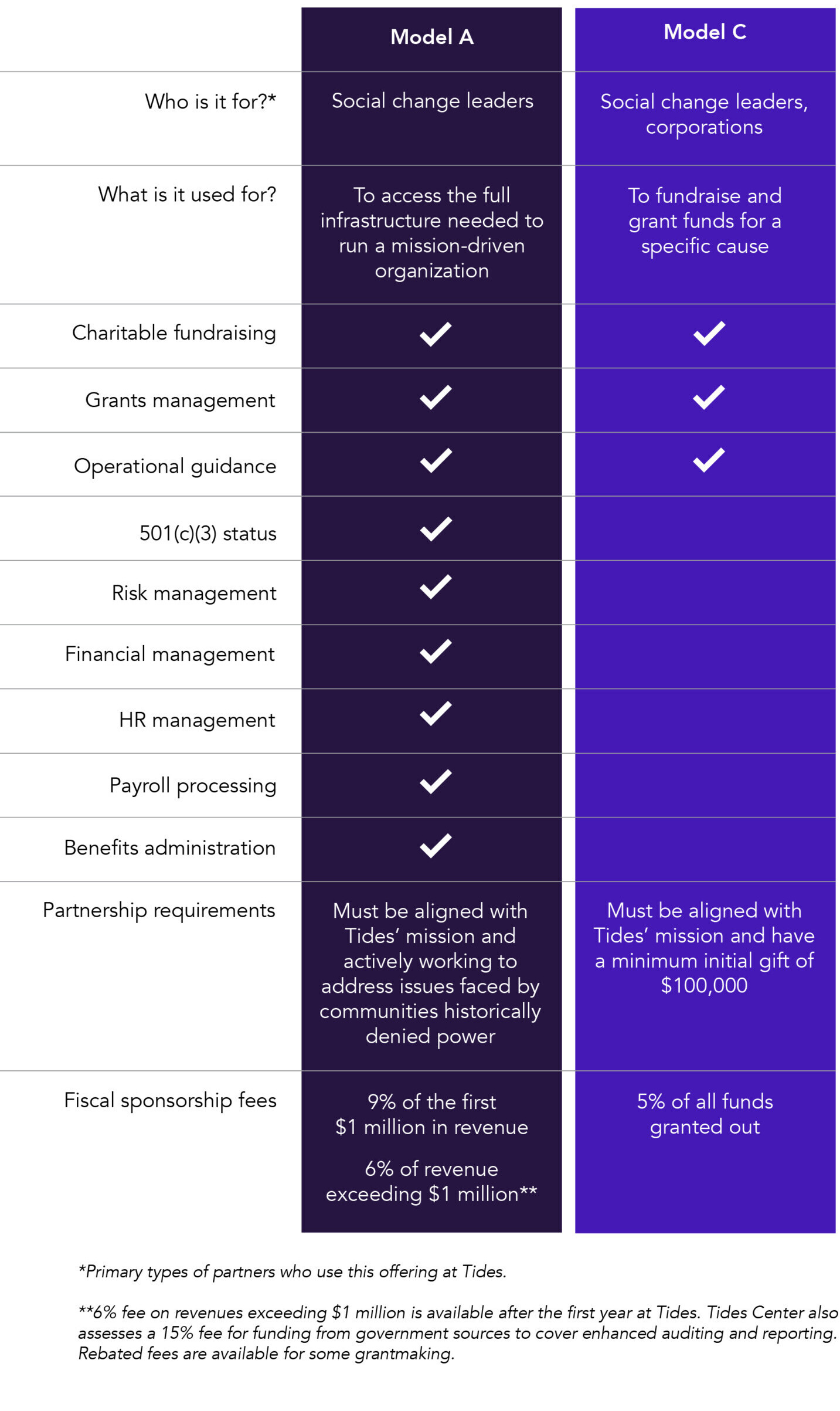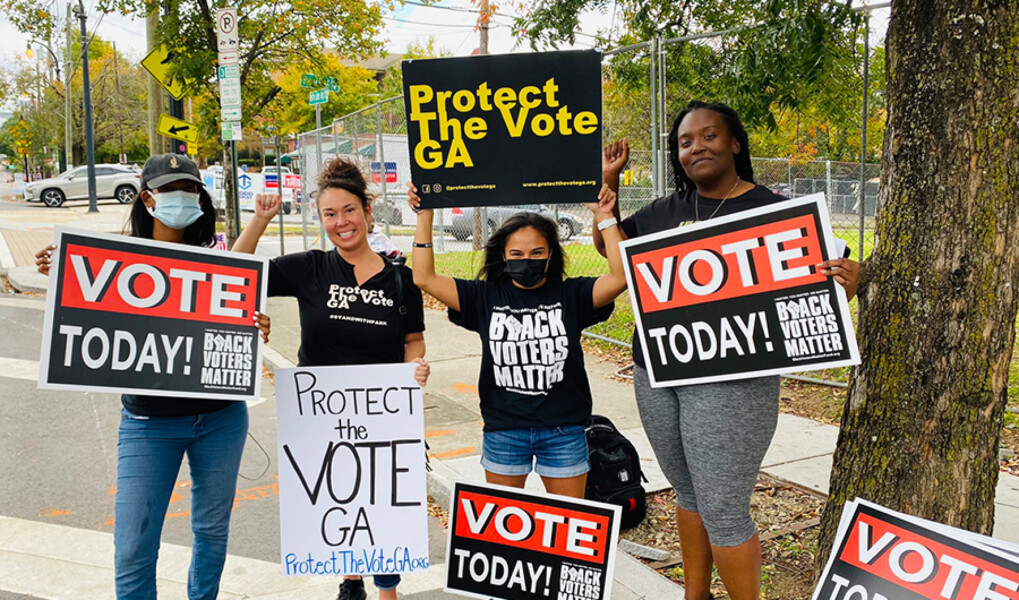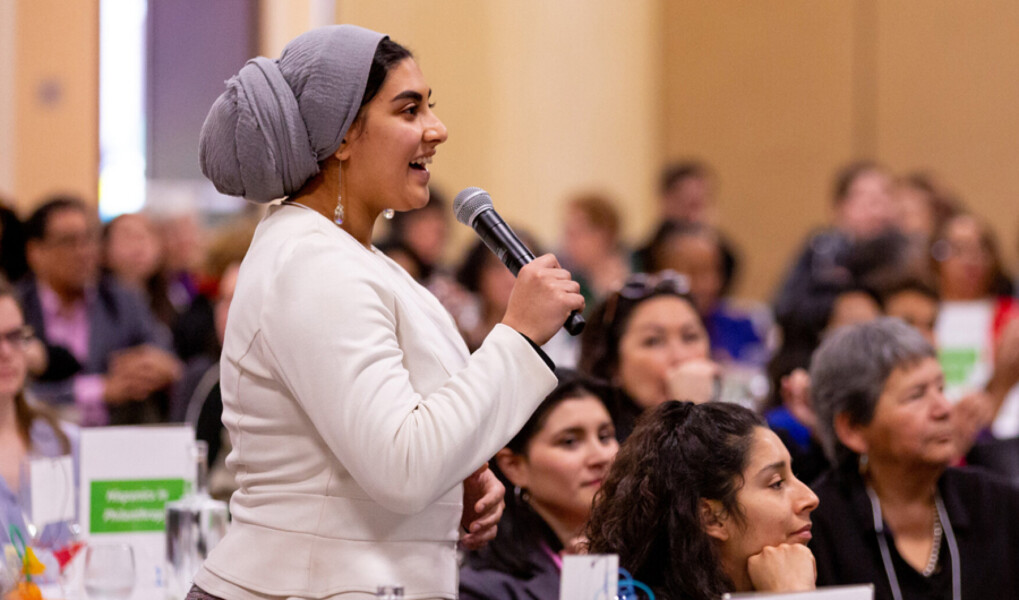Fiscal Sponsorship
Fiscal sponsorship at Tides is a powerful tool for justice. Our unique fiscal sponsorship offerings provide changemakers with a variety of options. Whether they’re fundraising for a specific initiative or relying on our full infrastructure to run their organization, we help social change leaders fuel their mission-driven work.
How Does Fiscal Sponsorship Work?
A fiscal sponsor is a nonprofit that extends its legal and 501(c)(3) tax-exempt status to efforts that align with its mission. We provide two options to meet our partners’ needs: Model A fiscal sponsorship for full-scale support and Model C fiscal sponsorship primarily for grantmaking purposes.
Model A Fiscal Sponsorship
Model A fiscal sponsorship is built for leaders who are looking to run a mission-driven organization and need finance, legal, and human resource support. Offered through Tides Center, Model A fiscal sponsorship unlocks a toolbox of resources that provide operational efficiencies, cost savings, and compliance support, along with connections to our network of leaders. Today, we’re privileged to serve 130 fiscally sponsored partners through our offerings, including:
- 501(c)(3) status: Extend our nonprofit status to raise funds for your organization.
- Operational guidance: Gain knowledgeable support from a designated advisor and nonprofit and philanthropy experts who share your values.
- Financial accounting: Track and monitor all revenues and expenditures, with monthly financial reports and annual auditing.
- Human resources (HR) management: Get full-cycle support to hire, retain, and develop employees, and synchronize key HR functions.
- Payroll processing services: Tides Center handles payroll and files the necessary compliance returns and reports.
- Benefits administration: We offer access to top carriers and values-aligned benefit options.
- Grants management: Tides Center administers all grant agreements and supports reporting.
Model C Fiscal Sponsorship
Model C fiscal sponsorship is an option for leaders primarily interested in fundraising and grantmaking. Also called a single entity fund at Tides, Model C fiscal sponsorship helps changemakers respond quickly to temporary or targeted needs — whether they’re a leader empowering proximate communities or an organization without 501(c)(3) status starting a charitable initiative to provide their programs to people in need. Offered through Tides Foundation, this option connects partners with:
- Fundraising: Donors can make tax-deductible donations to support your organization’s mission.
- Grants management: Tides Foundation administers all grant agreements.
Comparing Model A vs. Model C Fiscal Sponsorship
Learn about the different ways fiscal sponsorship can support mission-driven work.

Why Tides?
Tides brings deep expertise in nonprofit management and social justice to support our fiscally sponsored partners in amplifying their impact.
Mission
Tides seeks to realize a more just and equitable future by centering the leadership of communities who’ve been historically denied power. Through fiscal sponsorship, we equip our partners with the tools to address challenges within these communities, from climate justice to voting rights.
Expertise
Creating and managing an independent nonprofit or charitable initiative can be expensive, time-consuming, and complex. Tides’ long track record of operational excellence in nonprofit and grantmaking operations supports changemakers in launching new ideas or enhancing existing ones. We manage the behind-the-scenes, so our partners can focus their energy where it matters most: advancing justice on the ground.
Partnership
Tides Center is more than a fiscal sponsor — we’re a partner at every step of the journey toward social justice. Our team works closely alongside our partners to provide the back-end infrastructure for their work, including managing day-to-day operational functions, strategic advising and capacity-building, and flexible and responsive grantmaking.
Transparency
Though our partners can use fiscal sponsorship to receive donations and reduce the burdens of administration and compliance, our Model A fiscal sponsorship option means partners don’t have the flexibility to choose some of their own services, like insurance carrier, bank, or benefits. We’ll always explain these details fully and honestly, so our partners can make informed decisions.
Interested in partnering With Tides?
There’s no greater force than the collective power of people united for justice. Join us to fuel lasting change.
Frequently Asked Questions
Categories







